
Biology Methods & Protocols
Scope & Guideline
Bridging gaps in biological research through shared expertise.
Introduction
Aims and Scopes
- Methodological Innovations:
The journal focuses on publishing cutting-edge methodologies that facilitate biological research, including novel extraction techniques, imaging methods, and analytical protocols. - Interdisciplinary Approaches:
It encourages the integration of various disciplines such as bioinformatics, machine learning, and computational biology to enhance experimental design and data analysis. - Application of Emerging Technologies:
The journal highlights the use of advanced technologies like CRISPR, deep learning, and high-throughput screening to solve complex biological problems. - Protocols for Diverse Organisms:
It encompasses protocols applicable to a wide range of biological systems, including plants, animals, and microorganisms, reflecting the journal's commitment to a broad biological scope. - Focus on Reproducibility and Validation:
The journal emphasizes the importance of reproducibility in research by publishing detailed protocols that are rigorously validated and can be easily adopted by researchers.
Trending and Emerging
- Artificial Intelligence and Machine Learning Applications:
There is a growing emphasis on the application of AI and machine learning in biological research, particularly for data analysis, predictive modeling, and image processing, reflecting the increasing integration of computational techniques in biology. - High-Throughput Screening and Omics Technologies:
The rise of high-throughput methods, including genomics, proteomics, and metabolomics, is evident, as researchers seek to analyze complex biological systems more efficiently and comprehensively. - Microfluidics and Point-of-Care Diagnostics:
Innovations in microfluidic technologies and point-of-care testing methods are emerging, aimed at enhancing diagnostic capabilities and assay efficiency in various biological contexts. - CRISPR and Genome Editing Techniques:
The journal is witnessing an increase in the publication of protocols related to CRISPR technology and other genome editing techniques, as these tools continue to revolutionize genetic research. - Sustainable and Eco-Friendly Protocols:
There is an emerging interest in developing environmentally sustainable methodologies, indicating a shift towards incorporating ecological considerations in biological research protocols.
Declining or Waning
- Traditional Molecular Biology Techniques:
There is a noticeable decrease in the publication of papers focusing on classical techniques such as basic PCR and gel electrophoresis, as more sophisticated methods and technologies gain favor. - Generalized Laboratory Protocols:
The journal has moved away from publishing broad, generalized laboratory protocols in favor of more specialized and innovative methods that address specific research questions. - Single-Discipline Focus:
Papers that concentrate solely on one biological discipline without interdisciplinary approaches are becoming less common, reflecting a trend towards more integrated methodologies. - Descriptive Studies Without Novel Methodologies:
The publication of descriptive studies that do not introduce new methodologies or protocols is declining, as the journal prioritizes contributions that advance experimental techniques.
Similar Journals
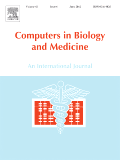
COMPUTERS IN BIOLOGY AND MEDICINE
Innovating Solutions at the Intersection of Biology and MedicineCOMPUTERS IN BIOLOGY AND MEDICINE is a prestigious academic journal published by Pergamon-Elsevier Science Ltd, dedicated to advancing the fields of Computer Science Applications and Health Informatics. With an impressive impact factor and ranking within the Q1 quartile for both categories, this journal plays a crucial role in disseminating high-quality research findings that influence cutting-edge developments at the intersection of computing and healthcare. Covering a broad range of topics from computational biology to medical informatics, it serves as a vital resource for researchers, professionals, and students striving to harness technology for medical advancements. The journal has been publishing since 1970 and continues to evolve, incorporating the latest trends and innovations in the field, thereby ensuring that it remains a key contributor to scientific inquiry and knowledge. With accessible content and a global reach, COMPUTERS IN BIOLOGY AND MEDICINE invites submissions that elevate the understanding and application of computational methods in biological and medical contexts.
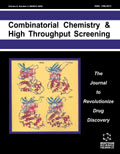
COMBINATORIAL CHEMISTRY & HIGH THROUGHPUT SCREENING
Exploring the Future of Organic Chemistry InnovationCOMBINATORIAL CHEMISTRY & HIGH THROUGHPUT SCREENING is an esteemed journal published by Bentham Science Publishers Ltd, focusing on the rapidly evolving fields of combinatorial chemistry and high-throughput screening. With ISSN 1386-2073 and E-ISSN 1875-5402, this journal provides a critical platform for researchers, professionals, and students engaged in the development and application of novel methodologies aimed at drug discovery and organic chemistry. Since its inception in 1998, the journal has consistently contributed valuable insights, achieving a respectable 2023 Category Quartile Ranking of Q3 across relevant categories including Computer Science Applications, Drug Discovery, and Organic Chemistry. Although it does not currently provide open access options, its rigorous peer-review process and commitment to scientific excellence enhance its reputation in the academic community. Researchers can leverage this journal's findings to stay at the forefront of advancements in their fields, making it an essential resource for anyone dedicated to innovation in chemistry and related disciplines.

MethodsX
Empowering innovation in clinical methods and laboratory practices.MethodsX is a premier peer-reviewed journal published by Elsevier, dedicated to advancing the field of applied methods across various disciplines, particularly in Clinical Biochemistry and Medical Laboratory Technology. Since its inception in 2014, this Open Access journal has fostered innovation by allowing researchers to share and access high-quality methodologies designed to enhance reproducibility and effectiveness in research practices. Based in the Netherlands, MethodsX has achieved an impressive ranking in the Scopus database, placing in the top 78th percentile among multidisciplinary journals. The journal is committed to providing researchers, professionals, and students with a platform to disseminate new techniques and strategies, ensuring that groundbreaking methods are readily available to the global scientific community. With a focus on fostering collaboration and interdisciplinary research, MethodsX aims to bridge gaps across various scientific domains and empower future advancements until its converged years in 2024.

Frontiers in Bioinformatics
Unlocking Insights at the Intersection of Biology and DataFrontiers in Bioinformatics is a leading academic journal dedicated to advancing the field of bioinformatics by publishing high-quality research and review articles. Published by FRONTIERS MEDIA SA, this open-access journal aims to foster innovative research, promote collaborative initiatives, and provide a platform for the dissemination of findings related to computational biology, biostatistics, and the intersection of bioinformatics with other biological disciplines. With a focus on promoting accessibility and visibility of research, Frontiers in Bioinformatics operates under a rigorous peer-review process, ensuring that all published content meets the highest academic standards. The journal has shown a commendable rank across various Scopus categories, including Mathematics, Computational Mathematics, and multiple dimensions of Biochemistry and Molecular Biology, indicating its relevance and impact within the research community. Researchers, professionals, and students will find this journal invaluable for staying abreast of the latest developments and breakthroughs in bioinformatics, enhancing their studies and professional projects.

Molecular Systems Biology
Pioneering Open Access for Global Scientific DialogueMolecular Systems Biology, published by SpringerNature, is a premier open access journal that has been a cornerstone in advancing the fields of biological science since its inception in 2005. With its ISSN 1744-4292, this journal exemplifies high scholarly standards, boasting an impressive suite of impact factors, including Q1 rankings across various disciplines such as Agricultural and Biological Sciences, Biochemistry, Genetics and Molecular Biology, and more, highlighting its significant contribution to the scientific community. The journal offers robust access options to facilitate innovative research dissemination, reaching a global audience while maintaining a commitment to fostering collaboration and dialogue among researchers, professionals, and students. With a focus on integrating quantitative approaches to biological systems, Molecular Systems Biology plays a vital role in addressing complex biological questions, paving the way for groundbreaking discoveries and advancements in healthcare, environmental sustainability, and functional genomics.
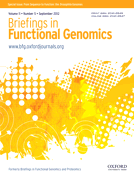
Briefings in Functional Genomics
Unveiling the Complexities of Molecular BiologyBriefings in Functional Genomics, published by Oxford University Press, serves as a crucial academic resource in the fields of biochemistry, genetics, and molecular biology. With an ISSN of 2041-2649 and an E-ISSN of 2041-2657, this esteemed journal explores innovative research and developments in functional genomics, with a commitment to advancing our understanding of genetic processes and their implications in health and disease. Ranking in the Q2 quartile for both Biochemistry and Genetics, and occupying a prominent Q1 status in the domain of interdisciplinary Medicine, the journal is positioned as a leading platform for researchers seeking to disseminate their findings to a global audience. Although it does not currently offer open access options, its accessibility through institutional subscriptions and its esteemed impact factor underscore its importance in the research community. Covering converging topics from 2010 to 2024, Briefings in Functional Genomics not only keeps pace with the rapidly evolving landscape of genomics but also stimulates collaboration and dialogue among scientists and industry professionals alike, making it an indispensable tool for researchers, practitioners, and students eager to engage with cutting-edge genomic science.
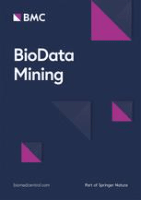
BioData Mining
Unlocking the Secrets of Biological DataBioData Mining is a distinguished open access journal published by BMC, focusing on the dynamic intersection of bioinformatics, computational mathematics, and molecular biology. Since its inception in 2008, this journal has provided a critical platform for researchers and professionals to publish their findings, contributing significantly to the collective knowledge in fields such as biochemistry, computational theory, and genetics. With a robust impact factor and a commendable h-index, BioData Mining continues to be a vital resource for academic and industrial advancements, ranked in the top quartiles in various categories according to the 2023 metrics. The journal's commitment to open access ensures that cutting-edge research is readily available to the global scientific community, thereby enhancing visibility and fostering collaboration among scholars. Whether you are a researcher, student, or practitioner, engaging with BioData Mining will equip you with relevant insights and developments in the fast-evolving realm of bioinformatics.
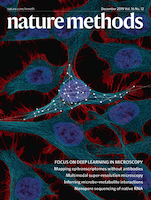
NATURE METHODS
Pioneering innovative techniques in biological research.NATURE METHODS, published by NATURE PORTFOLIO, is a prestigious journal at the forefront of publishing influential research in the disciplines of Biochemistry, Biotechnology, Cell Biology, and Molecular Biology. With a high impact factor and its exemplary Q1 rankings across various categories in 2023, this journal epitomizes excellence, providing a vital platform for researchers and professionals to disseminate groundbreaking methodologies and innovative techniques that drive scientific advancement. Established in 2004 and continuing through to 2024, NATURE METHODS encompasses a diverse array of research articles, reviews, and commentary, making it an essential resource for anyone involved in the biological sciences. While the journal is not currently open access, its contributions are invaluable, offering insights that not only elevate academic discourse but also enhance experimental practice and technological application. Its influence and rigorous peer review process ensure it remains a cornerstone in the rapidly evolving fields of biochemistry and molecular biology.

Applied Biosafety
Championing research that safeguards our environment and health.Applied Biosafety is a pivotal journal dedicated to advancing the field of biosafety, focusing on the critical intersections of biotechnology, public health, and environmental management. Published by MARY ANN LIEBERT, INC in the United States, this journal serves as a platform for the dissemination of innovative research and emerging practices that ensure safe handling of biological materials and safeguard public health. With an impactful track record reflected in its quartile standings across several categories—such as Q3 in Biotechnology and Q4 in Health, Toxicology and Mutagenesis—Applied Biosafety remains committed to enhancing standards and policies in biosafety. Though currently a subscription-based journal, it curates a rich repository of studies from 2001 to 2024, striving to support researchers, professionals, and students alike who are invested in the realms of biosafety and bioethics. By addressing policy implications and fostering compliance with health regulations, Applied Biosafety is an essential resource for anyone keen on contributing to the sustainable management of biological research hazards.

Cell Reports Methods
Bridging Disciplines for Impactful Scientific ProgressCell Reports Methods is a cutting-edge journal published by CELL PRESS, focusing on innovative methodologies in the vast fields of biochemistry, genetics, biotechnology, and radiological sciences. Launched in 2021, it has rapidly ascended to attain a Q1 ranking across multiple disciplines in the latest 2023 metrics, reflecting its influential contribution to the scientific community. With an emphasis on practical and rigorous experimental approaches, this journal serves as a vital resource for researchers looking to advance their methodologies and collaborate on significant findings in their respective specialties. Despite not being an open-access publication, Cell Reports Methods ensures broad accessibility through institutional subscriptions, allowing researchers from various backgrounds to engage with high-quality scholarly work. The journal presents a unique platform for sharing insights from interdisciplinary methods that foster innovation and discovery, ultimately shaping the future of scientific research.